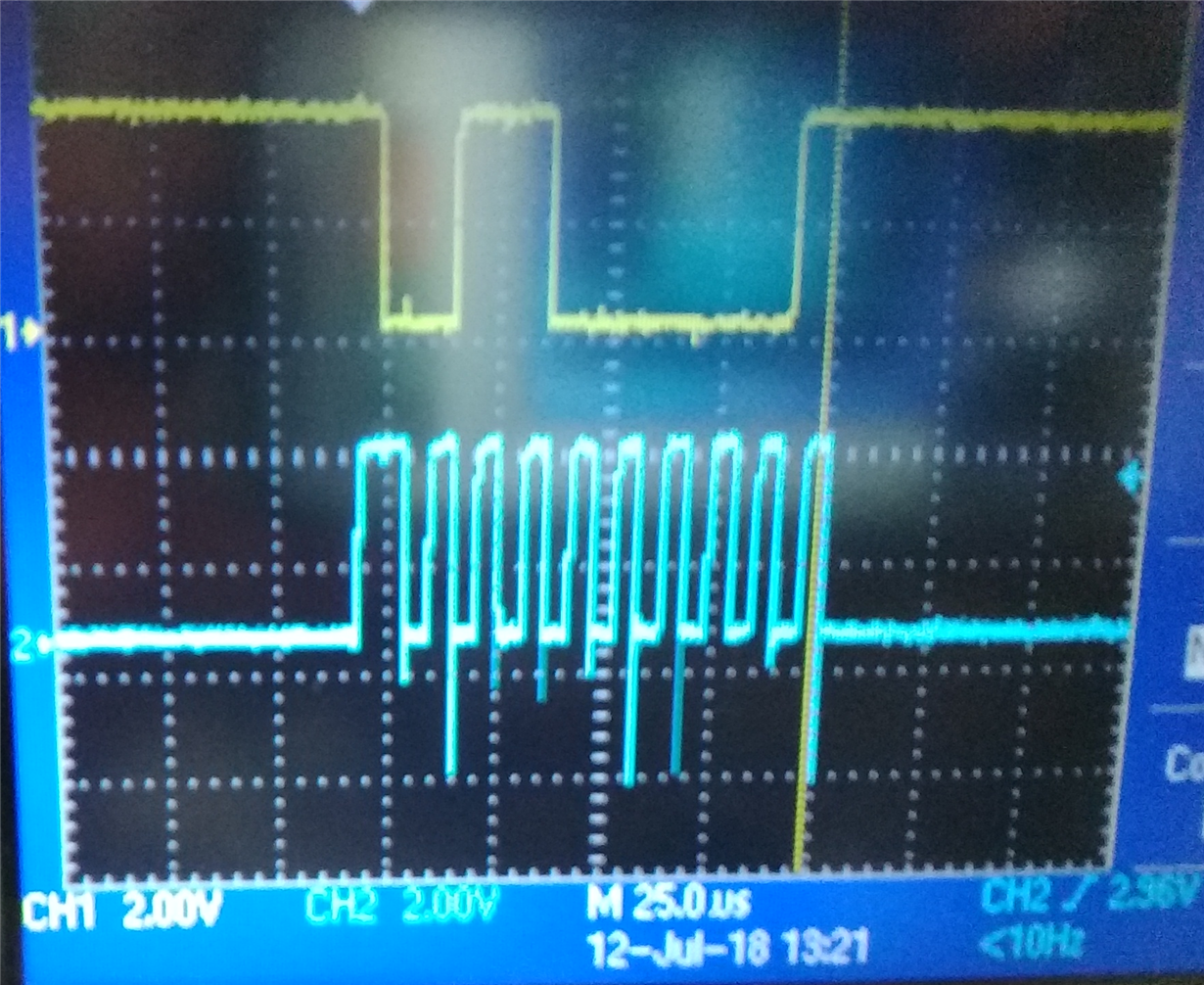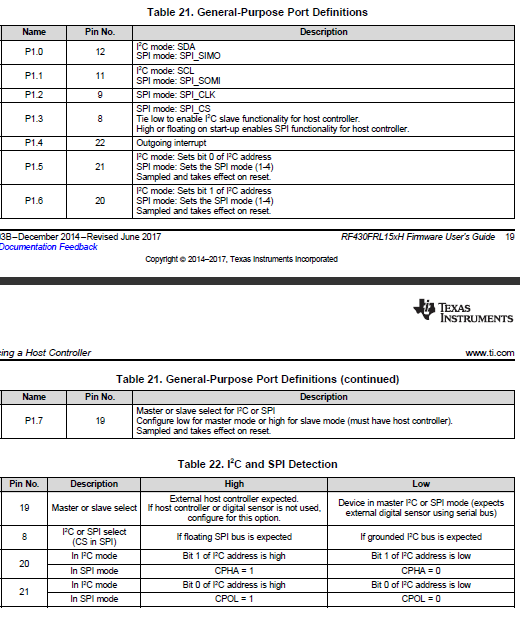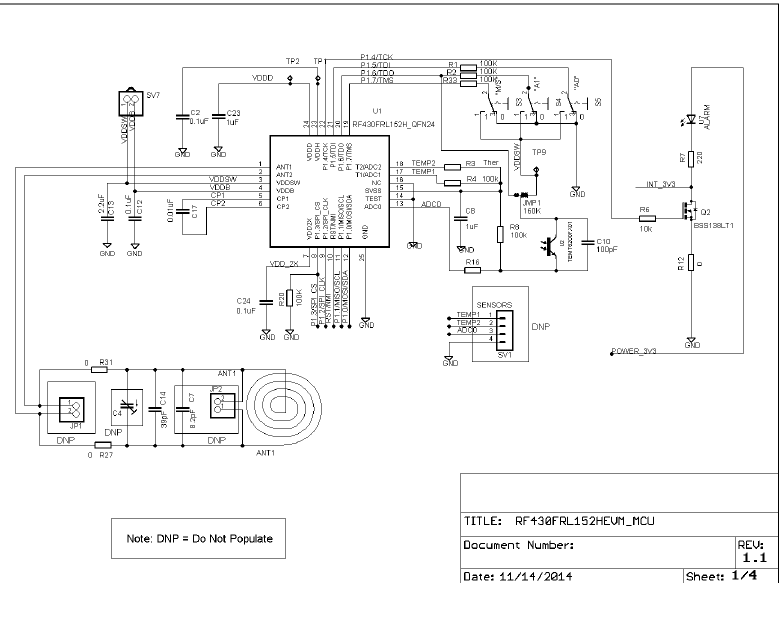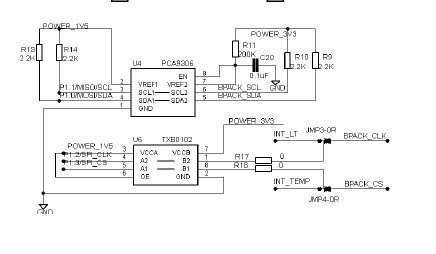Other Parts Discussed in Thread: MSP430G2553, , , RF430CL330H, RF430CL331H
Tool/software: Code Composer Studio
Hi,
I am facing Issue in I2C communication between MSP430G2553 and MSP430FRL152H . I am using MSP430FRL152H as a slave device.
For Master : i have picked example code from \slac485j\MSP430G2xx3_Code_Examples\C\msp430g2xx3_uscib0_i2c_08.c
/* --COPYRIGHT--,BSD_EX
* Copyright (c) 2012, Texas Instruments Incorporated
* All rights reserved.
*
* Redistribution and use in source and binary forms, with or without
* modification, are permitted provided that the following conditions
* are met:
*
* * Redistributions of source code must retain the above copyright
* notice, this list of conditions and the following disclaimer.
*
* * Redistributions in binary form must reproduce the above copyright
* notice, this list of conditions and the following disclaimer in the
* documentation and/or other materials provided with the distribution.
*
* * Neither the name of Texas Instruments Incorporated nor the names of
* its contributors may be used to endorse or promote products derived
* from this software without specific prior written permission.
*
* THIS SOFTWARE IS PROVIDED BY THE COPYRIGHT HOLDERS AND CONTRIBUTORS "AS IS"
* AND ANY EXPRESS OR IMPLIED WARRANTIES, INCLUDING, BUT NOT LIMITED TO,
* THE IMPLIED WARRANTIES OF MERCHANTABILITY AND FITNESS FOR A PARTICULAR
* PURPOSE ARE DISCLAIMED. IN NO EVENT SHALL THE COPYRIGHT OWNER OR
* CONTRIBUTORS BE LIABLE FOR ANY DIRECT, INDIRECT, INCIDENTAL, SPECIAL,
* EXEMPLARY, OR CONSEQUENTIAL DAMAGES (INCLUDING, BUT NOT LIMITED TO,
* PROCUREMENT OF SUBSTITUTE GOODS OR SERVICES; LOSS OF USE, DATA, OR PROFITS;
* OR BUSINESS INTERRUPTION) HOWEVER CAUSED AND ON ANY THEORY OF LIABILITY,
* WHETHER IN CONTRACT, STRICT LIABILITY, OR TORT (INCLUDING NEGLIGENCE OR
* OTHERWISE) ARISING IN ANY WAY OUT OF THE USE OF THIS SOFTWARE,
* EVEN IF ADVISED OF THE POSSIBILITY OF SUCH DAMAGE.
*
*******************************************************************************
*
* MSP430 CODE EXAMPLE DISCLAIMER
*
* MSP430 code examples are self-contained low-level programs that typically
* demonstrate a single peripheral function or device feature in a highly
* concise manner. For this the code may rely on the device's power-on default
* register values and settings such as the clock configuration and care must
* be taken when combining code from several examples to avoid potential side
* effects. Also see www.ti.com/grace for a GUI- and www.ti.com/msp430ware
* for an API functional library-approach to peripheral configuration.
*
* --/COPYRIGHT--*/
//******************************************************************************
// MSP430G2xx3 Demo - USCI_B0 I2C Master TX multiple bytes to MSP430 Slave
//
// Description: This demo connects two MSP430's via the I2C bus. The master
// transmits to the slave. This is the master code. It continuously
// transmits an array of data and demonstrates how to implement an I2C
// master transmitter sending multiple bytes using the USCI_B0 TX interrupt.
// ACLK = n/a, MCLK = SMCLK = BRCLK = default DCO = ~1.2MHz
//
// *** to be used with "msp430g2xx3_uscib0_i2c_09.c" ***
//
// /|\ /|\
// MSP430G2xx3 10k 10k MSP430G2xx3
// slave | | master
// ----------------- | | -----------------
// -|XIN P3.1/UCB0SDA|<-|---+->|P3.1/UCB0SDA XIN|-
// | | | | |
// -|XOUT | | | XOUT|-
// | P3.2/UCB0SCL|<-+----->|P3.2/UCB0SCL |
// | | | |
//
// D. Dang
// Texas Instruments Inc.
// February 2011
// Built with CCS Version 4.2.0 and IAR Embedded Workbench Version: 5.10
//******************************************************************************
#include <msp430.h>
unsigned char *PTxData; // Pointer to TX data
unsigned char TXByteCtr;
const unsigned char TxData[] = // Table of data to transmit
{
0x11,
0x22,
0x33,
0x44,
0x55
};
int main(void)
{
WDTCTL = WDTPW + WDTHOLD; // Stop WDT
P1SEL |= BIT6 + BIT7; // Assign I2C pins to USCI_B0
P1SEL2|= BIT6 + BIT7; // Assign I2C pins to USCI_B0
UCB0CTL1 |= UCSWRST; // Enable SW reset
UCB0CTL0 = UCMST + UCMODE_3 + UCSYNC; // I2C Master, synchronous mode
UCB0CTL1 = UCSSEL_2 + UCSWRST; // Use SMCLK, keep SW reset
UCB0BR0 = 12; // fSCL = SMCLK/12 = ~100kHz
UCB0BR1 = 0;
UCB0I2CSA = 0x48; // Slave Address is 048h
UCB0CTL1 &= ~UCSWRST; // Clear SW reset, resume operation
IE2 |= UCB0TXIE; // Enable TX interrupt
while (1)
{
PTxData = (unsigned char *)TxData; // TX array start address
TXByteCtr = sizeof TxData; // Load TX byte counter
while (UCB0CTL1 & UCTXSTP); // Ensure stop condition got sent
UCB0CTL1 |= UCTR + UCTXSTT; // I2C TX, start condition
__bis_SR_register(CPUOFF + GIE); // Enter LPM0 w/ interrupts
// Remain in LPM0 until all data
// is TX'd
}
}
//------------------------------------------------------------------------------
// The USCIAB0TX_ISR is structured such that it can be used to transmit any
// number of bytes by pre-loading TXByteCtr with the byte count. Also, TXData
// points to the next byte to transmit.
//------------------------------------------------------------------------------
#if defined(__TI_COMPILER_VERSION__) || defined(__IAR_SYSTEMS_ICC__)
#pragma vector = USCIAB0TX_VECTOR
__interrupt void USCIAB0TX_ISR(void)
#elif defined(__GNUC__)
void __attribute__ ((interrupt(USCIAB0TX_VECTOR))) USCIAB0TX_ISR (void)
#else
#error Compiler not supported!
#endif
{
if (TXByteCtr) // Check TX byte counter
{
UCB0TXBUF = *PTxData++; // Load TX buffer
TXByteCtr--; // Decrement TX byte counter
}
else
{
UCB0CTL1 |= UCTXSTP; // I2C stop condition
IFG2 &= ~UCB0TXIFG; // Clear USCI_B0 TX int flag
__bic_SR_register_on_exit(CPUOFF); // Exit LPM0
}
}
For Slave: Source code:
/* * main.c * * RF430FRL152H NFC Only Example Project * * Copyright (C) 2014 Texas Instruments Incorporated - http://www.ti.com/ * * * Redistribution and use in source and binary forms, with or without * modification, are permitted provided that the following conditions * are met: * * Redistributions of source code must retain the above copyright * notice, this list of conditions and the following disclaimer. * * Redistributions in binary form must reproduce the above copyright * notice, this list of conditions and the following disclaimer in the * documentation and/or other materials provided with the * distribution. * * Neither the name of Texas Instruments Incorporated nor the names of * its contributors may be used to endorse or promote products derived * from this software without specific prior written permission. * * THIS SOFTWARE IS PROVIDED BY THE COPYRIGHT HOLDERS AND CONTRIBUTORS * "AS IS" AND ANY EXPRESS OR IMPLIED WARRANTIES, INCLUDING, BUT NOT * LIMITED TO, THE IMPLIED WARRANTIES OF MERCHANTABILITY AND FITNESS FOR * A PARTICULAR PURPOSE ARE DISCLAIMED. IN NO EVENT SHALL THE COPYRIGHT * OWNER OR CONTRIBUTORS BE LIABLE FOR ANY DIRECT, INDIRECT, INCIDENTAL, * SPECIAL, EXEMPLARY, OR CONSEQUENTIAL DAMAGES (INCLUDING, BUT NOT * LIMITED TO, PROCUREMENT OF SUBSTITUTE GOODS OR SERVICES; LOSS OF USE, * DATA, OR PROFITS; OR BUSINESS INTERRUPTION) HOWEVER CAUSED AND ON ANY * THEORY OF LIABILITY, WHETHER IN CONTRACT, STRICT LIABILITY, OR TORT * (INCLUDING NEGLIGENCE OR OTHERWISE) ARISING IN ANY WAY OUT OF THE USE * OF THIS SOFTWARE, EVEN IF ADVISED OF THE POSSIBILITY OF SUCH DAMAGE. * */ #include "NDEF.h" #include "types.h" #include "patch.h" #include <rf430frl152h.h> #define PORT_I2C_OUT P1OUT #define PORT_I2C_DIR P1DIR #define PORT_I2C_SEL0 P1SEL0 #define PORT_I2C_SEL1 P1SEL1 #define SDA BIT0 #define SCL BIT1 //*****************************FUNCTION PROTOTYPES********************************/ void DeviceInit(void); //********************************************************************************/ #pragma RETAIN(PRxData); unsigned char *PRxData; // Pointer to RX data #pragma RETAIN(RXByteCtr); unsigned char RXByteCtr; #pragma RETAIN(RxBuffer); volatile unsigned char RxBuffer[128]; // Allocate 128 byte of RAM void I2C_init(void); void main() { WDTCTL = WDTPW + WDTHOLD; // Stop watchdog // ROM RF13M module setup ** The following three lines are needed for proper RF stack operation DS = 1; // ROM variable needs to be initialized here asm ( " CALL #0x5CDA "); // Call ROM function ( Initialize function pointers) asm ( " CALL #0x5CAC "); // Call ROM function ( Check part configuration) initISO15693(CLEAR_BLOCK_LOCKS); // clear all block locks //initISO15693(0); // leave block locks as they are set in FRAM //JTAG is set to be disabled in this function call DeviceInit(); //CopyFRAMtoNDEF(); I2C_init(); __bis_SR_register(GIE); while(1) { PRxData = (unsigned char *)RxBuffer; // Start of RX buffer RXByteCtr = 0; // Clear RX byte count __bis_SR_register(LPM3_bits + GIE); } } /************************************************************************************************************************************************** * DeviceInit *************************************************************************************************************************************************** * * Brief : Initialize the clock system and other settings * Patchable function * * Param[in] : parameters: has these independent options * INITIALIZE_DEVICE_CLOCK_SYSTEM - initializes the clock system * POPULATE_INTERRUPT_VECTOR_IN_INITIALIZATION - populate the default interrupt vectors and recalculate their CRC * * Param[out]: None * * Return None * * Patchable : Yes **************************************************************************************************************************************************/ void DeviceInit(void) { P1SEL0 = 0xF0; //keep JTAG P1SEL1 = 0xF0; //keep JTAG // P1SEL0 = 0x00; //no JTAG // P1SEL1 = 0x00; //no JTAG P1DIR &= ~0xEF; P1REN = 0; CCSCTL0 = CCSKEY; // Unlock CCS CCSCTL1 = 0; // do not half the clock speed CCSCTL4 = SELA_1 + SELM_0 + SELS_0; // Select VLO for ACLK and select HFCLK/DCO for MCLK, and SMCLK CCSCTL5 = DIVA_2 + DIVM_1 + DIVS_1; // Set the Dividers for ACLK (4), MCLK, and SMCLK to 1 CCSCTL6 = XTOFF; // Turns of the crystal if it is not being used CCSCTL8 = ACLKREQEN + MCLKREQEN + SMCLKREQEN; //disable clocks if they are not being used CCSCTL0_H |= 0xFF; // Lock CCS return; } void I2C_init(void) { //ROM sets P1OUT = 0x0F, this then consumes some current P1OUT = 0x00; // needed to reduce power consumption on RF430FRL152H EVM, since P1.3 is connected to a 2.2K Ohm resistor on the EVM to ground // Configure P1.0 and P1.1 pins for I2C mode PORT_I2C_SEL0 |= SCL + SDA; PORT_I2C_SEL1 &= ~(SCL + SDA); UCB0CTL1 |= UCSWRST; // eUSCI_B in reset state UCB0CTLW0 |= UCMODE_3; // I2C slave mode UCB0I2COA0 = 0x0048; // own address is 12hex // P2SEL |= 0x03; // configure I2C pins (device specific) UCB0CTL1 &= ~UCSWRST; // eUSCI_B in operational state // UCB0IE |= UCTXIE + UCRXIE; // enable TX&RX-interrupt UCB0IE |= UCTXIE; __bis_SR_register(GIE); // general interrupt enable return; } #pragma vector = RF13M_VECTOR __interrupt void RF13M_ISR(void) { switch(__even_in_range(UCB0IV,0x1e)) { case 0x00: // Vector 0: No interrupts break; case 0x16: // Vector 22: RXIFG0 UCB0STAT &= ~(UCSTPIFG + UCSTTIFG); // Clear interrupt flags if (RXByteCtr) // Check RX byte counter // __bic_SR_register_on_exit(CPUOFF); // Exit LPM0 if data was __bic_SR_register_on_exit(LPM0_bits | GIE); // Exit LPM0 break; case 0x18: // Vector 24: TXIFG0 *PRxData++ = UCB0RXBUF; // Move RX data to address PRxData RXByteCtr++; // Increment RX byte count break; default: break; } }
I am not able to receive T2C Rx/Tx interrupt. At SCL and ADA pin , 30k pullup is connected at master end (EXP430G2 lanch pad) and 2.2K pullup is connected on slave end (RF430FRL152HEVM board).
kindly provide any hint for go ahead.
Thanks,
AG





